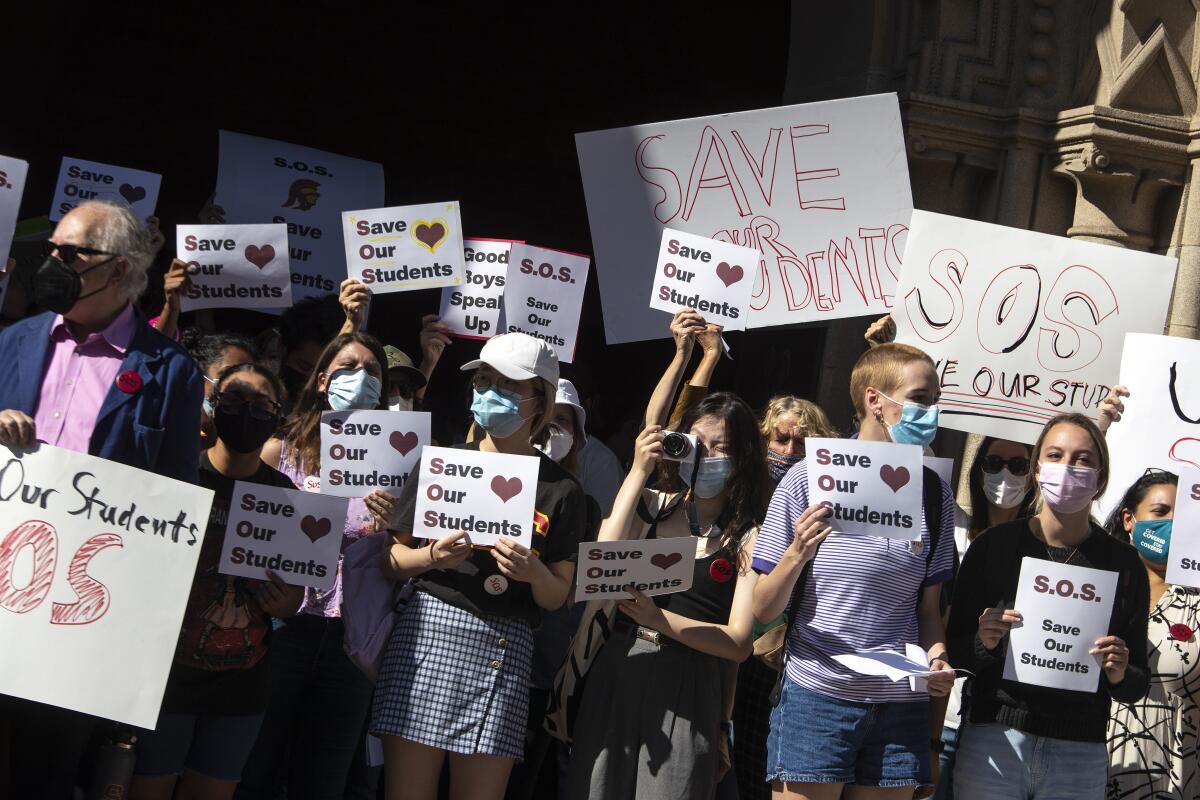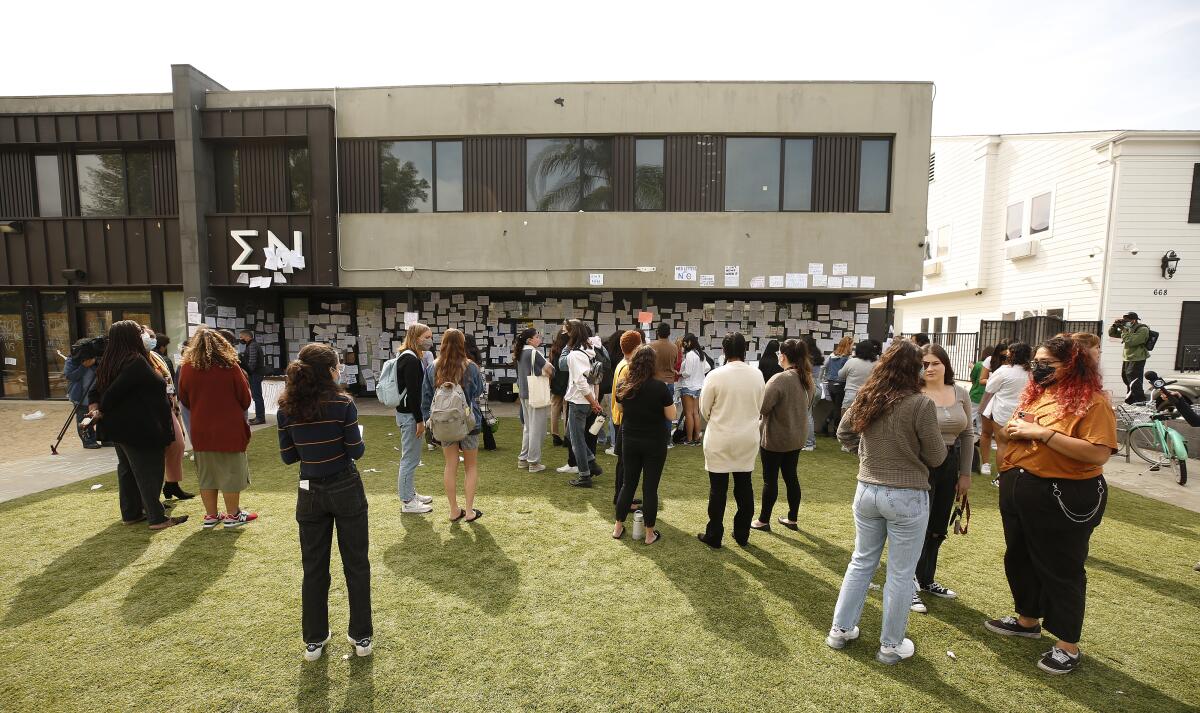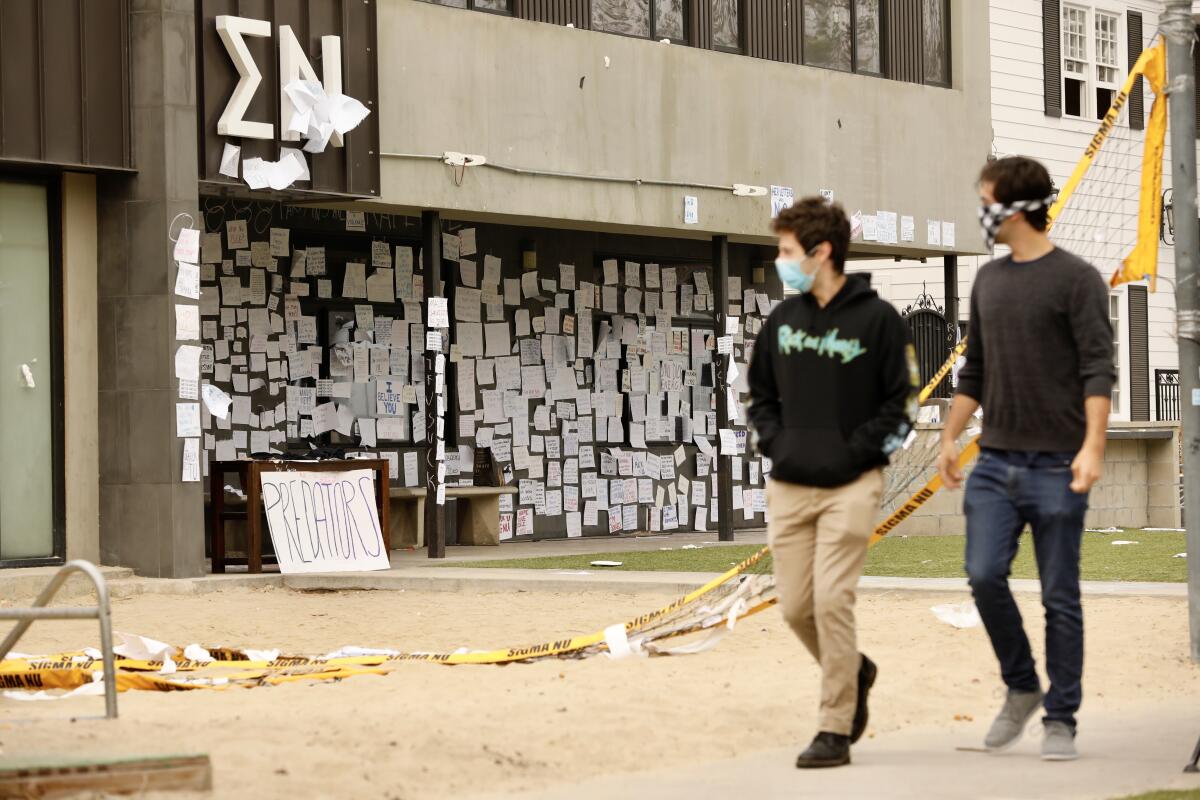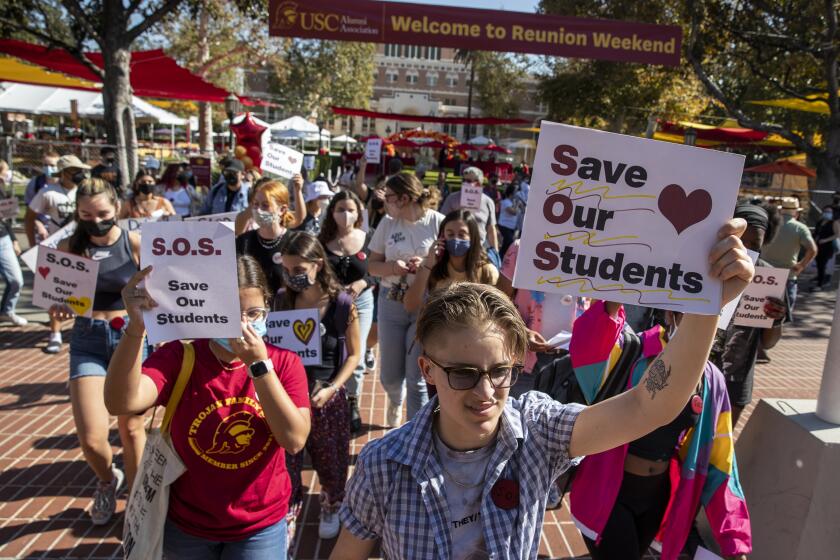USC’s ‘Greek experience’ under fire even as fraternities gain in popularity post-pandemic

Ralph Sun, a USC senior and fraternity member, can detail the ways Greek life has enriched him. The brotherhood gave him an instant friend group for backpacking, tailgating and sorority mixers; a support system during academic and personal struggles; a sense of purpose volunteering at a skid row shelter and at beach cleanups.
But he is now confronting the dark side of fraternities as campus outrage explodes over multiple allegations of drugging and sexual assault during parties at the USC chapter of Sigma Nu. Sun said the allegations shocked him and he quickly joined unprecedented and sustained demonstrations to stand with sexual abuse survivors and demand Greek system reforms, including a march of hundreds to fraternity and sorority row on West 28th Street.
“The Greek experience has provided a lot to me and I hope it will be here for generations of Trojans to come,” said Sun, a member of a fraternity he declined to name. “In order for that to happen, we have to own up to our checkered past and make our community a safe and inclusive space for everyone.”
The USC furor signals a pivotal moment for the American college fraternity system, as more Greek members and student coalitions mount protests against what one expert called the “unholy trinity” of dangerous drinking, misogyny and racial insensitivity that has plagued the all-male, mostly white organizations since their beginning two centuries ago. Many students say they were motivated to take stronger stands against the entrenched Greek system — and out fraternity abuses on social media — by the #MeToo movement and the Black Lives Matter demonstrations after the murder of George Floyd last year.
USC on Friday acknowledged a “troubling delay” in warning the campus community about allegations of drugging and sexual assault at the Sigma Nu fraternity house last month as criticism intensifies over the university’s handling of the crisis. A confidential campus reporting service received five to seven disclosures of possible drugging and assault in late September and took the rare step of informing university authorities Sept. 30. But USC officials did not notify the community until Oct. 20 — four days after another student reported sexual assault at Sigma Nu on Oct. 16.
The university received six reports of students alleging they had been drugged at Sigma Nu on Sept. 24, with one also alleging she had been sexually assaulted, according to Oct. 21 crime logs from the USC Department of Public Safety. An additional eight reports of sexual assault and seven reports of drugging taking place at various times, some allegedly involving other unnamed fraternities, have been filed since Oct. 22.
The university has suspended the Sigma Nu chapter and is enforcing the Interfraternity Council’s voluntary stop to all fraternity social gatherings while the situation is being reviewed.
“As president, I came to USC with the promise to confront what is wrong and lead the effort to fix what is broken,” President Carol L. Folt said in a letter to the campus community. “As we learn more, there will be some things we can do quickly and others that will take more time. This is too important to not get right.”
USC President Carol Folt acknowledged a “troubling delay” in warning the campus community about allegations of drugging and sexual assault by a fraternity last month
Folt and other leaders are meeting with student groups to hear their demands and have provided increased safety patrols on what is called “the row,” academic accommodations for impacted students and mental health support to those who need it, said USC spokeswoman Lauren Bartlett. New reports of troubling fraternity behavior create “an opportunity to consider serious reforms to the way fraternities operate at USC,” she said.
Rallies to demand action against fraternities — or abolish them altogether — have surged across the nation at campuses in New York, Iowa, Kansas, Massachusetts, Illinois, Mississippi and Nebraska. At Vanderbilt University in Tennessee, more than 200 sorority and fraternity members left their organizations last year, as Greek members posted accounts on Instagram of binge drinking, substance abuse, sexual assault and racial exclusion. In Pennsylvania, Swarthmore College’s two fraternities voluntarily disbanded in 2019 after two campus journals published leaked accounts of sexual misconduct and racism among members.
USC is one of the nation’s top-ranked campuses for Greek life; about 17% of undergraduates are members of 48 fraternities and sororities.
Natalia Parraz, a senior who helped organize the recent march on West 28th Street as a leader of a reproductive justice advocacy group called Flow, and Shannon Gibson, the organization’s faculty advisor, said protesters are demanding more accountability and transparency from the university and the Interfraternity Council — an umbrella organization for 16 of the 25 fraternity chapters at USC.
Gibson, a member of Concerned Faculty of USC, has talked with upset students, some particularly triggered with anxiety because they have survived sexual assault or know someone who has. She and other faculty are advocating for better mental health resources for students.
“There needs to be a broader understanding of how an event like this can affect someone,” especially a young student on a college campus for the first time without parents or an immediate support system, she said. “As professors, we’re not therapists but we want to be therapeutic.”

During days of demonstrations, students papered the Sigma Nu house with notes of protest, some profane. It was barricaded by a fence with a lone security guard walking the premise last week. Graffiti had been marked over, but an accusation of assault — “Rapists U Knew” — was in plain sight.
In a statement, the USC chapter of Sigma Nu said it was “deeply concerned” by the allegations and was fully cooperating with the investigation.
How exactly to reform fraternities, however, is a question that has long plagued colleges. Practically since the first social fraternity formed in 1825 — Kappa Alpha Society, the forerunner to today’s modern fraternity system — “debauchery and ambition” have been key ingredients of Greek life, according to John Hechinger, author of “True Gentlemen: The Broken Pledge of America’s Fraternities,” a 2017 book on fraternity culture focusing on Sigma Alpha Epsilon.
Hechinger documented the dangers associated with fraternities, citing studies that found members are twice as likely to engage in binge drinking and three times more likely to commit sexual assault than non-fraternity men. Lawsuits over hazing, sexual assault and drinking have skyrocketed — and many insurance companies dropped coverage of fraternities after they were ranked as the nation’s sixth-worst insurance risk, just above hazardous-waste disposal companies.
A 2019 survey of 182,000 students at 33 four-year campuses by the Assn. of American Universities found that fraternity houses were the top location cited in reports of nonconsensual sexual touching. The survey found that 25.9% of undergraduate women experienced sexual assault during four years of college — and at USC, the rate was 31%.
However, abolishing fraternities is unlikely because they are so popular, powerful and — particularly at public universities — protected by the right to freedom of association, Hechinger said. The nation’s roughly 70 historically white fraternities number about 390,000 active members and 4 million alumni. They own $3 billion in real estate on 800 U.S. campuses; raise more than $20 million annually, often from parties and dances; and count 40% of U.S. presidents and senators, along with corporate titans, in their ranks, according to his book.
USC Provost Charles Zukoski told faculty and students Friday after a campus demonstration that the university was not considering abolishment.
But Hechinger said this recent move to reform the Greek system from within could mark a turning point from futile past efforts to promote substantial change.
“A big difference we’re seeing, I think really for the first time, is activism from within fraternities and sororities,” he said. “In the past, there’s often been a call for colleges to ban or abolish fraternities or shut down chapters, and that’s been difficult. What fraternities may not be able to survive is if they’re out of step with the ethos of college students. If enough of their own members decide this kind of behavior is unacceptable, then I think there’s going to be a real push for change.”
That’s exactly what Annie Chen is hoping to achieve. The USC junior and Alpha Delta Pi sorority member helped organize the march last week to involve Girl Up USC, a nonprofit she leads that supports education and empowerment for adolescent girls.
“It’s been a very emotionally distraught and disturbing time, especially after learning that the campus I chose and would like to call home doesn’t feel safe to me,” Chen said. “That being said, I think the momentum pushing for change has been empowering. This could be a pivotal moment.”

Chen believes that fraternity culture needs to change — starting with social events she said “perpetuate rape culture” by deliberately inviting more women than men and serving free-flowing alcohol. One 2020 USC graduate, who asked to be identified only by her first name, Erin, said that fraternity party themes — such as Playboy or sleepovers — promote a culture of misogyny.
Erin said she and a friend were touched and dragged across the dance floor by one male at a party they attended in 2017. She was able to pull free but her friend later told her the man had reached down and sexually penetrated her with his fingers without her consent. When he grabbed her hand and tried to place it on his crotch, the friend pushed away and left, telling Erin: “I feel dirty, I feel gross.” She never reported the incident, and Erin said she was floored when she recounted the assault to sorority friends and they shrugged it off as something to be expected at fraternity parties.
“Greek life is absolutely building rape culture,” Erin said. “Something drastic has to change.”
Judson Horras, president of the North American Interfraternity Conference, said fraternities are here to stay. Enrollment reached near-record levels this fall as students hunger for connection after months of pandemic isolation, he said. The organizations should be seen as a positive way to boost the declining share of men in college, he added, citing studies that have found fraternity men enjoy better mental health than their non-Greek peers.
The vast majority of fraternity members are appalled by sexual assault and are working to change the culture, Horras said, adding that brothers at other campuses — in Kansas and Iowa, for instance — have been the whistleblowers to report sexual assaults in their ranks.
The national conference banned hard alcohol at fraternity houses in 2019 — a policy that is just beginning its real-life rollout as students return to campus after months of virtual learning. It also supports federal anti-hazing legislation.
Hechinger said colleges and fraternities should publicly post data relevant to a fraternity’s safety record, such as substantiated sexual assault claims, alcohol-related transports to hospitals and student conduct violations.
A 2018 USC review of safety protocols for Greek life recommended that such data be publicly reported, but university officials declined to respond to questions about what triggered the review and whether the data-sharing project has been launched.
Horras said the most lasting changes will come not from top-down dictates but from the kind of student activism that many Greek members are now promoting. Chen, the USC sorority member, agrees. She and others also have demanded university expulsion of those responsible for the alleged assaults, more sexual assault training across campus, a greater understanding of Title IX reporting procedures and more funding for sexual violence services.
Sun said that USC fraternity parties are strictly regulated, with requirements for an outside security guard for every 50 attendees, a professional bartender and drinks in closed containers, such as beer or seltzer cans, but that more needs to be done.
Ideas include greater use of testing strips that can detect drugs in a drink and more education on sexual violence prevention and “toxic masculinity and gender inclusivity,” a topic some USC fraternities have begun discussing with partners such as Women’s Voices Now, he said. Sun said he was also interested in adopting an idea from UC Berkeley fraternities that went viral a few year ago: reviewing the principles of consent and securing agreement to them before people are allowed entry to events.
Whether such reforms will result in widespread and lasting change, however, remains unclear. Even after the national Sigma Alpha Epsilon organization took the high-profile step of banning its pledging process in 2014 after a string of hazing deaths, the practice remains. Two students at Texas A&M University recently filed a $1-million lawsuit against the fraternity, alleging that industrial-strength cleaner was poured on them, causing serious burns, during hazing.
“The major challenge of fraternities is to disentangle some of their nobler aspects from the chaos and debauchery,” Hechinger said. “They need to figure out a way to do that and haven’t, by and large, up to now.”
More to Read
Start your day right
Sign up for Essential California for news, features and recommendations from the L.A. Times and beyond in your inbox six days a week.
You may occasionally receive promotional content from the Los Angeles Times.









